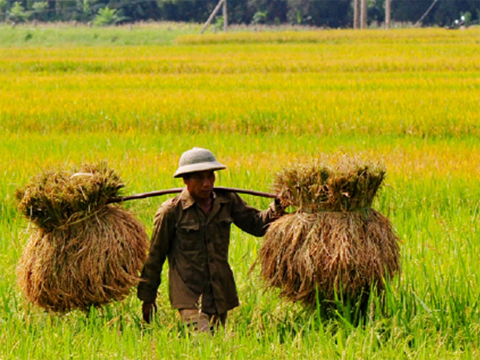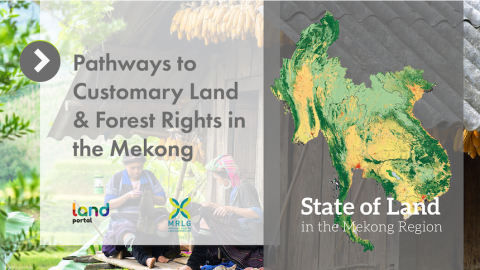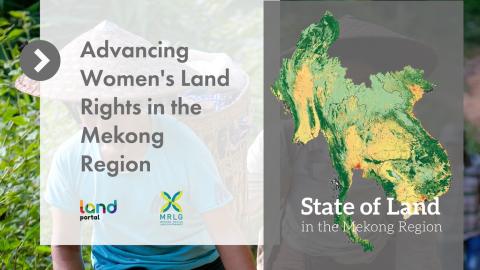Discover hidden stories and unheard voices on land governance issues from around the world. This is where the Land Portal community shares activities, experiences, challenges and successes.
 Follow our
Follow our
Sustainable Development Goals
Blog Series!
Interested in land corruption?
Follow our Land & Corruption Blog Series
for in-depth perspectives from the experts.
Issues
Geographical focus
On January 23, 2025, the Land Portal Foundation and Mekong Region Land Governance (MRLG) convened a webinar to explore the evolving landscape of agricultural investments in the Mekong region. Experts from various sectors joined to discuss the impact of industrial crops, smallholder farmer integration into transnational value chains, and the resulting economic, environmental, and social transformations.
The webinar “Pathways to Customary Land & Forest Rights in the Mekong” took place on July 2nd, 2024. This was the second webinar in the series ‘State of Land in the Mekong region’ which aims to highlight the evolving environment of land governance in this dynamic region, including Cambodia, Lao PDR, Myanmar and Vietnam. The webinar attracted 240 participants and featured experts from the Mekong region.
This webinar took place on February 15th, 2024, under the title “Women’s Participation in Land Governance in the Mekong : Moving Beyond Quotas to Meaningful Inputs and Influence”. The webinar featured panelists from researchers to youth representatives and was jointly organized by the Land Portal Foundation and Mekong Region Land Governance (MRLG).
Sr. Elizabeth Daley, Independent freelance consultant and Chair of the Land Portal Foundation, moderated the panel, which featured the following speakers:
Maize is a key global cash crop, produced in every continent except Antarctica. As a flex crop, it has multiple uses including for direct human consumption, as an ingredient for animal feed, as a key component in processed foods, or in ethanol production. According to figures from FAOSTAT, global production increased from 0.2 to 1.2 billion tons between 1961 and 2020.
Curating land information is part of our daily work in the Land Portal. It includes selecting, categorizing, and enriching information with analysis and/or additional data, graphic visualizations, etc. In times with so much information available to choose from, people are increasingly seeking sources that offer selections of high-quality knowledge and provide analysis that make sense of it. Understanding how partners in the land community are meeting this demand is a great source for us to improve our work of curating, and providing meaning to land data.
The effectiveness of sustainable land use governance can be undermined if local affected people perceive land-use policies as not reflecting social objectives, or as ‘unjust.’ To transform externally-conceived sustainability principles from the international level into on-the-ground practice, involves the interplay of various organizations and peoples from the government, civil society, and the private sector.
Environmental policy interventions often result in conflicts because they fail to recognize people’s identity and sense of belongings, as shaped through the places where they live. A recent paper explores a case study of a palm oil project in East Kalimantan, Indonesia, in which competing claims of recognition and land rights have led to conflict between transmigrants and indigenous Kutai people.
Summaries and selected replays from the 3rd Mekong Regional Land Forum are available below. Full replays of the plenary sessions will be posted shortly -- check back soon!
How many good land reports go unnoticed because there is too much information to choose from in the first place?
Bearing this in mind, Land Portal developed the Country Insights digest* - a reflection on some of the most important new articles and reports that aims to identify the most current points of discussion around land in different countries, distil key messages and points of debate, and offer you an entry point to learn more.
As part of the launch of the Responsible Land-Based Investment Navigator 2.0, the Land Portal spoke with Nathaniah Jacobs, Senior Researcher at the International Institute for Environment and Development, to hear more about the Advancing Land-based Investment Governance (ALIGN) project. The Navigator is positioned to be a valuable tool and resource for ALIGN stakeholders.
Since last year, 35,000 people in Uganda’s Kiryandongo district were forced from their lands to make way for large-scale farming, including at gunpoint and by a sugar firm with international backing




